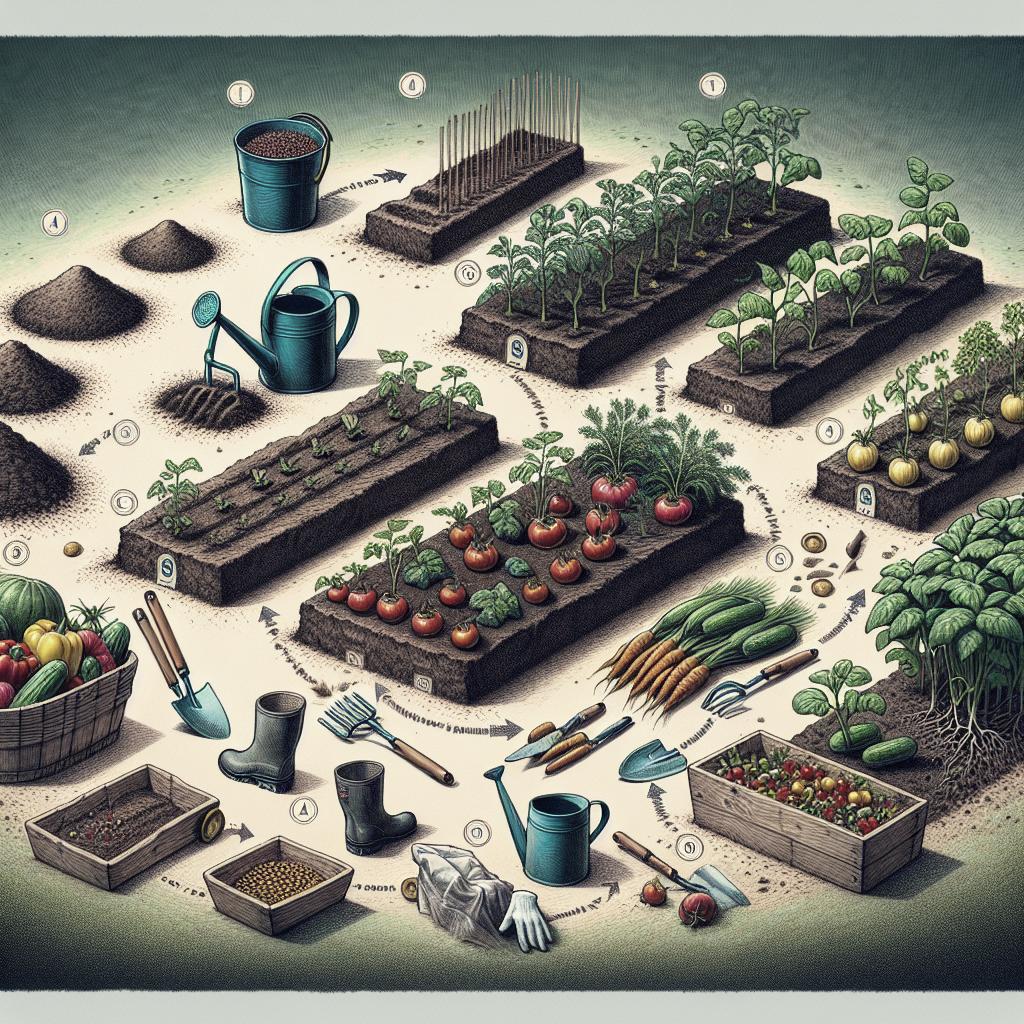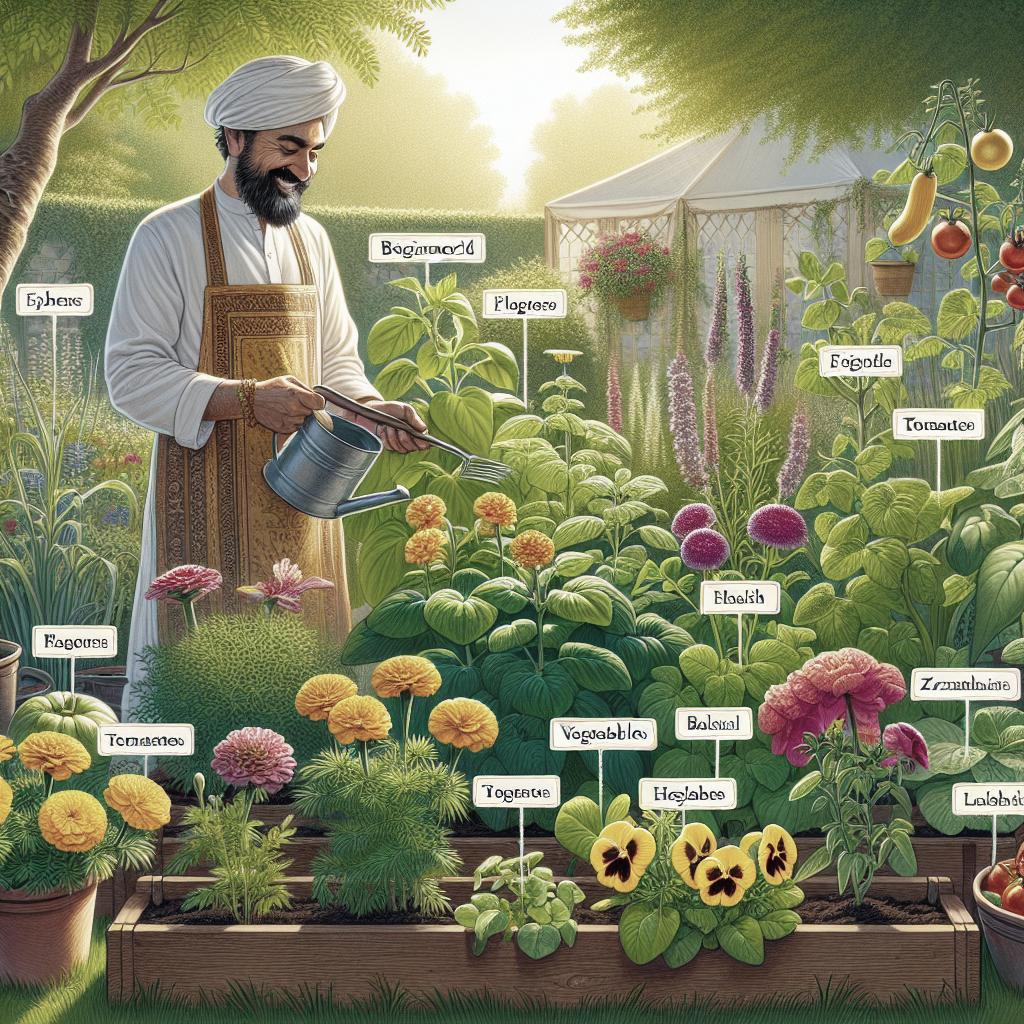“`html
How to Control Pests Naturally in the Garden
In pursuing a healthy and thriving garden, controlling pests naturally is an excellent strategy for gardeners who want to maintain an organic practice while respecting the environment. This comprehensive guide will delve into preventive measures, advocate the inclusion of beneficial insects, and offer various natural remedies and traps to keep pests at bay. From aphids to deer, we’ll cover a wide spectrum of pests and provide eco-friendly solutions to manage them effectively, without resorting to harsh chemicals. Finally, you’ll find a convenient summary table that encapsulates the key elements discussed.
Prevention
Prevention is the first line of defense in natural pest control for your garden. It involves creating an environment that discourages pest infestations from the start. One effective strategy is to cultivate a diversity of plants, as this attracts a variety of insects, which can help maintain a balanced ecosystem. Different plants act as companions, supporting each other’s growth and deterring pests.
Keeping your garden clean and free from debris also prevents pests from settling in. Regularly remove dead leaves and weeds, prune your plants to improve air circulation, and ensure proper spacing to reduce the chance of disease transmission. Rotating crops and selecting pest-resistant plant varieties can further strengthen your garden’s resilience against pests.
Beneficial Insects
Introducing beneficial insects to your garden is a sustainable method of pest control. These insects act as natural predators to common garden pests and help maintain the ecological balance. By providing a habitat that attracts these allies, you can reduce the pest population without harmful chemicals.
Brachonids, Chalcids, and Ichneumon Wasps
Brachonids, chalcids, and ichneumon wasps are tiny parasitic wasps that can significantly reduce the number of pest insects in your garden. They target caterpillars, beetles, and aphids by laying their eggs inside or on them, ultimately leading to the pest’s demise. These wasps are attracted to gardens with plenty of flowering plants, so planting dill, fennel, or coriander can enhance their presence.
By encouraging these wasps into your garden, you are promoting a self-sustaining ecosystem. They are harmless to humans and pets, making them a perfect ally for gardeners committed to organic practices.
Non-toxic Homemade Remedies for Common Garden Pests
Homemade remedies are a popular choice for gardeners who prefer natural solutions over chemical pesticides. These remedies use common household items to deter pests and can be easily tailored to address specific pest problems in your garden.
Soft-bodied Insects (mites, aphids, mealy bugs)
For soft-bodied insects such as mites, aphids, and mealy bugs, a simple solution of water and mild soap can be highly effective. Mix one tablespoon of mild liquid soap with one quart of water and spray it directly onto the affected plants. This mixture suffocates the insects without harming the plants.
Neem oil is another excellent remedy for soft-bodied insects. It disrupts their life cycle and acts as a repellent. Mix two teaspoons of neem oil with a gallon of water and spray it on infested plants. Not only does it deter pests, but neem oil also benefits plants by providing mild fungicidal properties.
Other Natural Controls for Common Insect Pests
In addition to beneficial insects and homemade remedies, other natural controls can help manage common insect pests in your garden. These methods focus on deterring pests through repellents and enhancing garden biodiversity.
Aphids
Aphids are notorious for their rapid reproduction and can cause significant damage. Planting garlic or onions near aphid-prone plants serves as a natural deterrent due to their strong scent. Additionally, spraying a mixture of water, a few drops of essential oils (such as peppermint or cedarwood), and a bit of dish soap can repel these pests.
Spider Mites
Spider mites thrive in hot and dry conditions and can be challenging to control. A solution of water and rosemary oil can be an effective deterrent. Spray it on affected plants to disrupt the mites’ feeding and reproduction cycles. Introducing predators like ladybugs or predatory mites can also keep spider mite populations in check.
Traps and Barriers
Traps and barriers are non-toxic methods that physically prevent pests from reaching your plants. These tools are effective for controlling flying and crawling insects, and they can be used in conjunction with other natural strategies.
Yellow Flypaper
Yellow flypaper is a simple yet effective tool to capture flying insects such as whiteflies and gnats. The bright color attracts pests, and the sticky surface traps them. Hang flypaper near affected plants and areas where pests commonly gather for optimal results.
Apple Maggot Traps
Apple maggot traps are an excellent way to protect fruit trees from infestation. These traps typically consist of red spheres coated with a sticky substance that attracts apple maggots. Hanging these traps before fruit sets can significantly reduce maggot populations by capturing adults before they lay eggs on the fruit.
Deer Control
Deer can cause extensive damage to gardens by feeding on plants, especially during the growing season. Natural deer control methods focus on deterrents and barriers to protect your garden effectively.
For Larger Volume Applications, Mix the Following Ingredients:
To prepare a natural deer repellent, combine one gallon of water, one egg, one tablespoon of dish soap, and a tablespoon of cooking oil. Blend the ingredients well and spray the mixture around the perimeter of your garden. The smell discourages deer from venturing into your garden without harming them.
Site Visitors Offer These Suggestions for Nontoxic Deer Control:
Site visitors have shared that hanging strips of metallic tape or wind chimes around the garden perimeter can deter deer due to the noise and reflections they create. Another suggestion is to use scented bars of soap around your garden beds. The strong smell confuses deer and keeps them at bay.
Rodent Control
Rodents like mice and voles can wreak havoc in gardens by feeding on young plants and bulbs. Natural rodent control focuses on deterrents and habitat management. One effective approach is to remove hiding spots and nesting materials such as stacks of wood, dense vegetation, or mulch layers. Keeping the garden tidy reduces the chances of rodents settling in.
Additionally, using organic rodent repellents, such as peppermint oil-soaked cotton balls, can discourage rodents from entering the garden area. Place these around garden borders or entry points. For severe infestations, installing barriers like mesh or hardware cloth beneath raised beds or around vulnerable plants can provide effective protection.
Mole Control
Moles can disrupt gardens by creating tunnels and uprooting plants. Natural mole control techniques include creating a less attractive environment for them or using deterrents. Reducing the grub and insect population in your garden, which moles primarily feed on, can drive them to search for food elsewhere. Applying beneficial nematodes to garden soils effectively limits grub presence.
Another approach involves planting plants like marigolds and daffodils, which moles tend to avoid due to their scent. Alternatively, sprinkling castor oil granules or liquid castor oil around moles’ active areas discourages them from tunneling into treated regions.
Related Guides:
For additional information, consider reviewing guides on specific pest management strategies and organic gardening methods to complement this natural pest control approach. Integrating multiple techniques can enhance the effectiveness of your pest control strategy and support a healthy garden ecosystem.
Share This Article:
If you found this guide helpful, share it with fellow gardening enthusiasts who might benefit from these natural pest control methods. By spreading eco-friendly gardening techniques, we collectively contribute to a healthier environment.
| Method | Description |
|---|---|
| Prevention | Plant diversity, garden cleanliness, crop rotation, and pest-resistant plants to deter pests. |
| Beneficial Insects | Encourage predators like Brachonids and chalcids to naturally reduce pests. |
| Homemade Remedies | Use soap solutions and neem oil for soft-bodied pests. |
| Other Natural Controls | Plant garlic for aphids and use essential oils for a variety of pests. |
| Traps and Barriers | Employ flypaper and apple maggot traps for flying insects. |
| Deer Control | Use egg-based sprays and noise deterrents for animal pests. |
| Rodent Control | Organize garden tidiness and use peppermint oil to repel rodents. |
| Mole Control | Apply castor oil and plant deterrent flowers to drive away moles. |
“`


